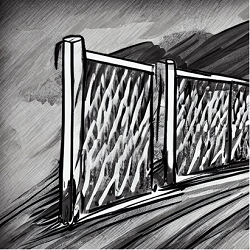
Regime protection, state violence and disputed changes in land use
Regimes controlling wealth generated from exploitation of resources may exercise violent protection against any threats to power.
A (Optimist)
More transparency, more international awareness hinder misuse of state power and land grabbing
- Easily accessible technologies (like YouTube) are used effectively to document state violence and raise awareness of the oppression, in turn increasing domestic and international pressure on the regime
- Climate change fosters a discussion about how land and its use is intrinsically connected to people’s identity and well-being; international regulations follow which reduce the land grabbing conflict induced migration
- Western states, under pressure from an increasing number of authoritarian ones, seriously collaborate to set and enforce consequences on state leaders and their business interests for any human rights violations
B (Pessimist)
Regime evictions become more frequent and geographically widespread
- International channels for journalism and reporting are controlled, so there is no global public left to watch state violence; the state ‘cleanses’ its population to only leave those who agree to a given regime
- Eviction orders becoming the regular and widespread regime behaviour
- Bitcoins open up new ways of money laundering and bribing, so that regimes become more effective at buying continued support
C1 (Mediator)
Democracies on the rise lead to lower level of regime violence
- After the wave of de-democratisation eases off, another wave of democratisation - with associated lower levels of regime protection violence - takes place reducing regime violence-led migration
- In many autocratically ruled countries in Africa, economic expansion vastly enlarges a middle class which manages to secure more democratic rights
C2 (Mediator)
State violence and land grabbing are intensified by climate change
- In the wake of adaptation to climate challenges, regimes put more emphasis on cooperation and hence pursue more mitigating (than profit increasing or self-protecting) policies
- Evictions of minority groups and political opposition continue to take place (to reward those who favoured the regime)
- Targeted state violence increases in frequency, though it is highly focused
D (Innovator)
Technology reduces resource scarcity and helps safeguard ethno-minorities
- Less dependency on land, so less conflict on disputed land
- Technology monitoring oppression in various countries and mechanism allowing certain individuals to seek international protection if they are oppressed and vulnerable